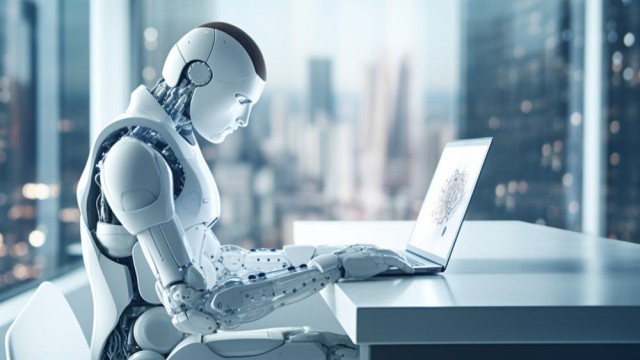In a comprehensive analysis of the evolving programming landscape, experts delve into the intricacies of coding's future amidst the proliferation of artificial intelligence (AI). With technological advancements reshaping industries worldwide, the role of programming is undergoing a seismic shift, prompting a reevaluation of its necessity in the age of AI.
The Evolution of Programming
Programming, once heralded as the cornerstone of future careers, has undergone significant transformations in recent years. With the rise of AI and automation, the traditional roles of programmers are being redefined, leading to a debate on the relevance and necessity of coding skills in the modern era.
The Rise of AI: Redefining Programming Roles
The advent of AI has brought about a transformation in the programming landscape. No longer confined to writing lines of code, programmers are transitioning to more strategic roles, leveraging AI to automate routine tasks and optimize performance. The emergence of AI specialists, ethicists, and trainers underscores the interdisciplinary nature of programming in the AI era, paving the way for new opportunities and job roles.
Pros of Learning Programming:
1.Diverse Career Opportunities: From software development to data science, programming offers a wide array of career paths.
2.Enhanced Problem-Solving Skills: Learning to code fosters logical thinking and problem-solving abilities.
3.Promotes Creativity: Coding encourages creative thinking and innovation.
4.High Demand: The demand for skilled programmers continues to grow.
5.Lifelong Learning: Programming offers continual opportunities for learning and growth.
6.Automation and Efficiency: Automation tools enhance efficiency and flexibility in applying programming knowledge.
Cons of Learning Programming:
1.Steep Learning Curve: Learning programming can be challenging and requires dedication.
2.Sedentary Work: Programming often involves long hours of sitting, which can impact physical health.
3.Keeping Up with Industry Changes: Staying updated with rapid technological advancements can be demanding.
4.Complexity and High Expectations: The complexity of coding projects and high expectations can be daunting for beginners.
The Advent of AI in Programming
AI's impact on programming extends beyond automation and optimization. With the development of advanced AI models such as OpenAI's Sora, capable of generating hyper-realistic videos based on text descriptions, the boundaries of programming are continuously expanding. AI's ability to generate code, debug, optimize, automate testing, deploy, and translate languages heralds a new era in programming, one where human programmers collaborate with AI to achieve unprecedented levels of efficiency and innovation.
The Future Outlook: Adapting to Change
As the programming landscape continues to evolve, the future remains uncertain yet full of possibilities. While AI's capabilities continue to expand, human programmers remain indispensable for their creativity, critical thinking, and ethical decision-making abilities. The future of programming lies in adaptation, with programmers embracing new tools, methodologies, and job roles to navigate the ever-changing technological landscape.
Embracing New Challenges: The Role of Human Programmers
In an era dominated by AI, human programmers face new challenges and opportunities. The need to upskill and adapt to emerging technologies is paramount, as AI integration reshapes traditional programming roles. However, human programmers bring unique qualities to the table, including creativity, empathy, and ethical judgment, that are irreplaceable by AI. Embracing these qualities and leveraging AI as a powerful tool, programmers can continue to drive innovation and shape the future of technology.
AI in Education: Preparing the Next Generation
With AI playing an increasingly prominent role in programming and technology, there is a growing need to incorporate AI education into school curricula. By equipping the next generation with AI literacy and programming skills, educators can empower students to thrive in an AI-driven world. From coding workshops to AI ethics courses, education plays a crucial role in shaping the future of programming and preparing individuals for the challenges and opportunities ahead.
Ethical Considerations: Navigating the Moral Landscape
As AI becomes more integrated into programming and technology, ethical considerations take center stage. From bias in algorithms to the impact of AI on employment, programmers must navigate complex moral dilemmas and ensure the responsible use of AI. By prioritizing ethical principles and promoting transparency and accountability, programmers can mitigate the risks associated with AI and foster trust in technology.
Diversity and Inclusion: Building a More Equitable Future
In the rapidly evolving field of programming, diversity and inclusion are essential for driving innovation and addressing societal challenges. By embracing diversity in backgrounds, perspectives, and experiences, the programming community can foster creativity, collaboration, and empathy. From promoting women in tech to supporting underrepresented communities, efforts to build a more inclusive programming ecosystem are crucial for shaping a more equitable future.
Bridging the Skills Gap: Upskilling for the Future
As AI reshapes the programming landscape, there is a growing demand for individuals with advanced skills in AI development, machine learning, and data science. Bridging the skills gap requires a concerted effort from educators, employers, and policymakers to provide training and educational opportunities that equip individuals with the knowledge and expertise needed to thrive in an AI-driven world.
The Role of Governments: Policy Implications for AI and Programming
Governments play a crucial role in shaping the future of AI and programming through policy and regulation. From funding research and development initiatives to establishing ethical guidelines and standards, governments can influence the trajectory of AI adoption and integration. Balancing innovation with accountability, policymakers must collaborate with industry stakeholders to ensure that AI technologies are developed and deployed responsibly for the benefit of society.
Industry Perspectives: Navigating the AI Revolution
From tech giants to startups, industries across sectors are grappling with the implications of AI on programming and technology. While AI presents unprecedented opportunities for innovation and efficiency, it also poses challenges in terms of job displacement and ethical considerations. Industry leaders must prioritize responsible AI development and invest in employee training and development to ensure a smooth transition to an AI-driven future.
Harnessing the Power of AI: Innovation and Collaboration
Despite the challenges posed by AI, there is immense potential for innovation and collaboration in the programming community. By harnessing the power of AI tools and technologies, programmers can streamline workflows, optimize performance, and unlock new possibilities in software development, data analysis, and beyond. Collaboration between human programmers and AI systems holds the key to unlocking the full potential of AI in the programming landscape.
The Global Impact of AI: Implications for Developing Economies
As AI continues to transform the programming landscape, its impact extends beyond developed nations to developing economies. While AI presents opportunities for economic growth and development, it also poses challenges in terms of job displacement and inequality. To ensure that the benefits of AI are equitably distributed, policymakers and industry stakeholders must prioritize inclusive growth and invest in education and training programs that empower individuals to thrive in an AI-driven world.
In conclusion, the future of programming is intricately intertwined with the rise of AI. While AI has the potential to revolutionize the field, human programmers remain indispensable for their creativity, critical thinking, and ethical judgment. By embracing new technologies, upskilling, and fostering collaboration and innovation, programmers can navigate the ever-changing landscape of programming in the age of AI and shape a brighter future for the industry and society as a whole.






























Comment: